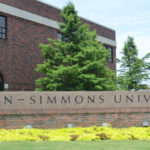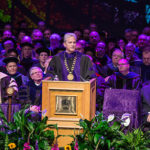Posted: 8/28/07
Hardin-Simmons pulls out
of magazine’s ranking race
By Ken Camp
Managing Editor
ABILENE—Hardin-Simmons University has announced it no longer will participate in surveys conducted by U.S. News & World Report for its annual list of “America’s best colleges”—even though it has advanced in the rankings and been named a tier-one school in its division five consecutive years.
The Abilene university joined more than 60 schools nationwide that have disengaged from the magazine’s ranking race.
“Although many feel the U.S. News rankings are the ‘gold standard’ for comparing learning institutions, such rankings systems are not always the best tool for gauging a student’s learning experience,” Hardin-Simmons President Craig Turner said.
“Although HSU continues to advance in the U.S. News rankings, the university is exploring other qualitative comparative evaluation programs.”
Hardin-Simmons ranked No. 34 in the magazine’s “master’s-west” group—a regional category that includes colleges and universities granting primarily undergraduate and master’s degrees but few, if any, doctoral degrees.
U.S. News focuses largely on entrance scores, high school rankings and other criteria for entering students, but it does not seek any evaluation from current students or alumni, Turner noted.
Hardin-Simmons particularly takes issue with the peer evaluation process, since the magazine places it in the western division, but its accreditation and major relationships are to the east, he added.
“West coast institutions are asked to evaluate schools in Texas with whom they have no regular dealings and vice versa,” Turner said.
Leaders of several other Baptist General Convention of Texas-affiliated schools expressed reservations about the U.S. News ranking system, but some have opted for a “wait-and-see” approach for now.
East Texas Baptist University President Bob Riley met with his cabinet to weigh the pros and cons of continuing to provide information to the magazine, according to university spokesman Mike Midkiff. With the input of cabinet members, Riley decided to continue to consider ETBU’s options and to solicit the opinions of the deans of the university’s seven schools, he added.
ETBU ranked No. 12 in the magazine’s “baccalaureate-west” regional division for schools that offer primarily undergraduate liberal-arts programs where fewer than 50 percent of students receive degrees in traditional liberal-arts disciplines.
Howard Payne University President Lanny Hall called the U.S. News rankings “far from perfect,” but he added: “The rankings have brought unprecedented recognition to our university. … While we would like to see improvements in the rankings process, much of the information presented is very valuable to students and parents.”
Howard Payne received a No. 3 ranking in the magazine’s “best value” list, Hall noted.
Howard Payne is “not dissatisfied to the point that we are ready to withdraw from submitting data to the publication,” he added. “We will carefully consider our options. There is always the chance that the process might change between now and next year. If it is improved between now and next spring, we do not want to close the door to future participation.”
Wayland Baptist University President Paul Armes offered a more pointed criticism of the magazine’s rankings—particularly the survey that peer institutions complete.
“The survey lacks validity because so much of it is subjective,” Armes said, who noted he hasn’t filled out the survey on other universities for several years. “The idea that I would know how good an education … (is provided) by any of our regional schools—that I as an outsider could evaluate them accurately—is not realistic.”
Some of the criteria used by the magazine are “somewhat artificial and easily manipulated by statistical gains,” he asserted. Furthermore, most students who attend Wayland choose the school based on the recommendation of trusted friends or relatives, not its ranking in a magazine, he noted.
“In our case, one of the things that is mentioned a lot is the faith component, and that is not mentioned in U.S. News,” Armes said.
Houston Baptist University President Robert Sloan disagreed.
“We are in a competitive marketplace as a university, and we want to share information with parents and students who are in the decision-making process,” Sloan said.
HBU tied with the University of Mary Hardin-Baylor at the No. 48 spot and Dallas Baptist University ranked No. 58 in the magazine’s “master’s-west” group—a regional category that includes colleges and universities granting primarily undergraduate and master’s degrees.
“As a distinctively Christian university, we know that our core values are not measured by the U.S. News & World Report ranking system, but there are criteria which correspond to our values as a student-centered campus,” he added, pointing to information such as average class size, the student-to-faculty ratio and the graduation rate.
“As an institution, we are not modeling ourselves after the criteria,” he said. “We know that measurement is a necessary component in the evaluation process.”
During Sloan’s tenure as president at Baylor University, one of his goals was to help that school achieve recognition as a “top-tier” national university in the U.S. News rankings.
John Barry, vice president for marketing and communications at Baylor, acknowledged, “Ranking systems of any type are quite often flawed in one manner or another.” He particularly noted the subjective nature of the U.S. News academic reputation survey completed by college presidents, chief academic officers and admissions directors.
“While other portions of the assessment are objectively based, the criticism relative to the subjective nature of the academic reputation survey is warranted,” Barry said.
Still, Baylor will continue to provide information “to a wide variety of college guide books, including those produced by U.S. News,” he said. U.S. News ranked Baylor University No. 75 in the “national universities” category this year.














We seek to connect God’s story and God’s people around the world. To learn more about God’s story, click here.
Send comments and feedback to Eric Black, our editor. For comments to be published, please specify “letter to the editor.” Maximum length for publication is 300 words.